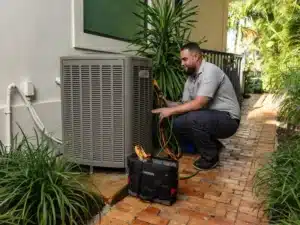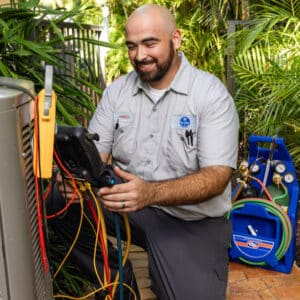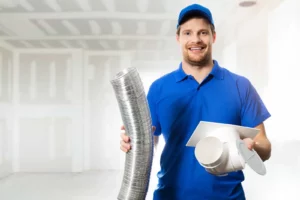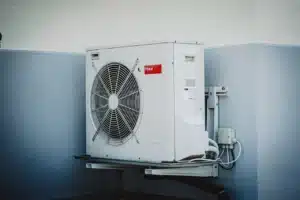How Regular AC Maintenance Can Save You Money
Maintaining your air conditioner regularly is more than just a...
When it comes to maintaining comfort and managing energy costs in Florida, air conditioning plays a central role. Traditional HVAC systems, while effective, can sometimes lead to inefficiencies, especially when ductwork is involved. Ductless HVAC systems, also known as mini-split systems, have become a popular choice for homeowners and business owners in Florida seeking to maximize energy efficiency without sacrificing comfort. These systems offer a variety of benefits that can help lower energy bills, improve temperature control, and even enhance air quality.
This blog post will explore the energy efficiency of ductless HVAC systems, how they work, and why they may be the ideal solution for Florida’s hot and humid climate.
A ductless HVAC system consists of two main components: an outdoor unit that houses the compressor and an indoor unit installed in the room or zone being cooled. Unlike traditional HVAC systems, ductless systems do not require ductwork to distribute air throughout a home or building. Instead, each indoor unit is connected directly to the outdoor unit via small refrigerant lines, providing precise control over the temperature in each zone.
These systems are available in both cooling-only models and heat pump versions, allowing them to provide both heating and cooling. The absence of ductwork is one of the key factors that contribute to their energy efficiency.
Ductless HVAC systems are often more energy-efficient than traditional systems for several reasons:
1. Zoned Heating and Cooling
One of the most significant advantages of ductless systems is the ability to create “zones” within a building. Each indoor unit can be controlled independently, allowing you to adjust the temperature based on the specific needs of each room or area. In a traditional HVAC system, air is distributed throughout the entire home, even to areas that may not need cooling. This can lead to energy waste, especially in rooms that are rarely used or are already at a comfortable temperature.
With a ductless system, you can focus cooling efforts on the areas where it’s most needed, rather than wasting energy cooling unused spaces. This ability to control the temperature in individual rooms or zones helps you avoid unnecessary energy consumption, making it a more efficient option for Florida homeowners and businesses.
2. No Duct Losses
Traditional HVAC systems rely on ducts to distribute cooled or heated air. However, ducts can be prone to leaks and inefficiencies, which leads to energy losses. According to the U.S. Department of Energy, up to 30% of energy can be lost through leaky or poorly insulated ducts. This is especially problematic in Florida, where air conditioners are running frequently, and energy efficiency is a top concern.
Because ductless systems don’t rely on ductwork, they eliminate the risk of energy loss through leaky ducts. This results in more efficient use of energy and reduces the strain on the system, ultimately lowering your energy bills.
3. Inverter Technology
Many modern ductless systems feature inverter technology, which helps improve energy efficiency by allowing the compressor to adjust its speed based on the cooling or heating demands. Traditional air conditioners and heating systems operate by cycling on and off, using a lot of energy each time they restart. In contrast, inverter-driven systems continuously run at variable speeds, adjusting power output as needed. This means the system doesn’t need to work as hard to maintain the desired temperature, reducing energy consumption and operating costs.
Inverter technology also helps maintain a more consistent temperature within a room. Traditional systems often experience temperature fluctuations as they cycle on and off, but ductless units provide steady, even cooling and heating, improving comfort and efficiency.
4. Energy Star Certification
Many ductless HVAC systems are Energy Star certified, meaning they meet strict energy efficiency guidelines set by the U.S. Environmental Protection Agency (EPA). Energy Star-rated systems are designed to reduce energy consumption without sacrificing performance. This certification ensures that the system is optimized for efficiency, which can result in lower energy bills over time.
By choosing an Energy Star-certified ductless HVAC system, Florida homeowners and businesses can ensure they are making an environmentally friendly choice while also saving money on their energy costs.
Beyond energy efficiency, ductless systems offer other advantages that are especially beneficial in Florida’s climate:
1. Compact and Flexible Installation
Ductless systems are compact and easy to install, making them an ideal choice for homes or buildings that lack space for bulky ductwork. They can be installed in various configurations, allowing for flexibility in how and where the units are placed. Whether you’re retrofitting an older home or adding cooling to a new space, ductless systems offer a convenient and efficient solution.
2. Humidity Control
Florida’s high humidity levels can make the summer heat feel even more oppressive. Ductless systems are effective at removing excess humidity from the air, providing a more comfortable indoor environment. By controlling both temperature and humidity, these systems help improve indoor air quality and reduce the discomfort that comes with Florida’s muggy weather.
3. Quiet Operation
Ductless systems are known for their quiet operation. The indoor units operate at a low noise level, allowing for a more peaceful and comfortable environment. This is particularly beneficial for bedrooms, offices, or other areas where noise levels need to be kept to a minimum.
4. Improved Air Quality
Many ductless HVAC systems are equipped with advanced filtration systems that help improve indoor air quality by trapping dust, pollen, and other allergens. This feature is especially important in Florida, where pollen levels can be high during certain seasons. The air filters help keep your home or business environment cleaner and healthier, reducing the likelihood of respiratory issues or allergies.
Ductless systems can be an excellent choice for many Florida homeowners and businesses, but they may not be the best solution for every situation. Consider the following factors when deciding if a ductless system is right for you:
In Florida, where air conditioning is a necessity for much of the year, choosing an energy-efficient HVAC system is essential. Ductless systems offer several advantages, including zoned temperature control, elimination of duct losses, inverter technology, and the availability of Energy Star-certified models. These features not only improve comfort but also help reduce energy bills, making ductless systems a smart investment for homeowners and businesses in Florida.
By choosing a ductless HVAC system for your Florida home or business, you can enjoy better energy efficiency, reduced utility bills, and a more comfortable environment year-round. If you’re ready to learn more about ductless systems or need help with installation, contact your local HVAC professional to explore the best options for your needs. The right system can make a noticeable difference in both your energy savings and comfort.

Maintaining your air conditioner regularly is more than just a...

Florida homeowners rely on air conditioning more than most parts...

Indoor air quality is a major concern for many Florida...

Indoor air quality, often abbreviated as IAQ, plays a crucial...

Installing a new HVAC system is a significant investment in...

For many homeowners in Florida, the HVAC system is the...